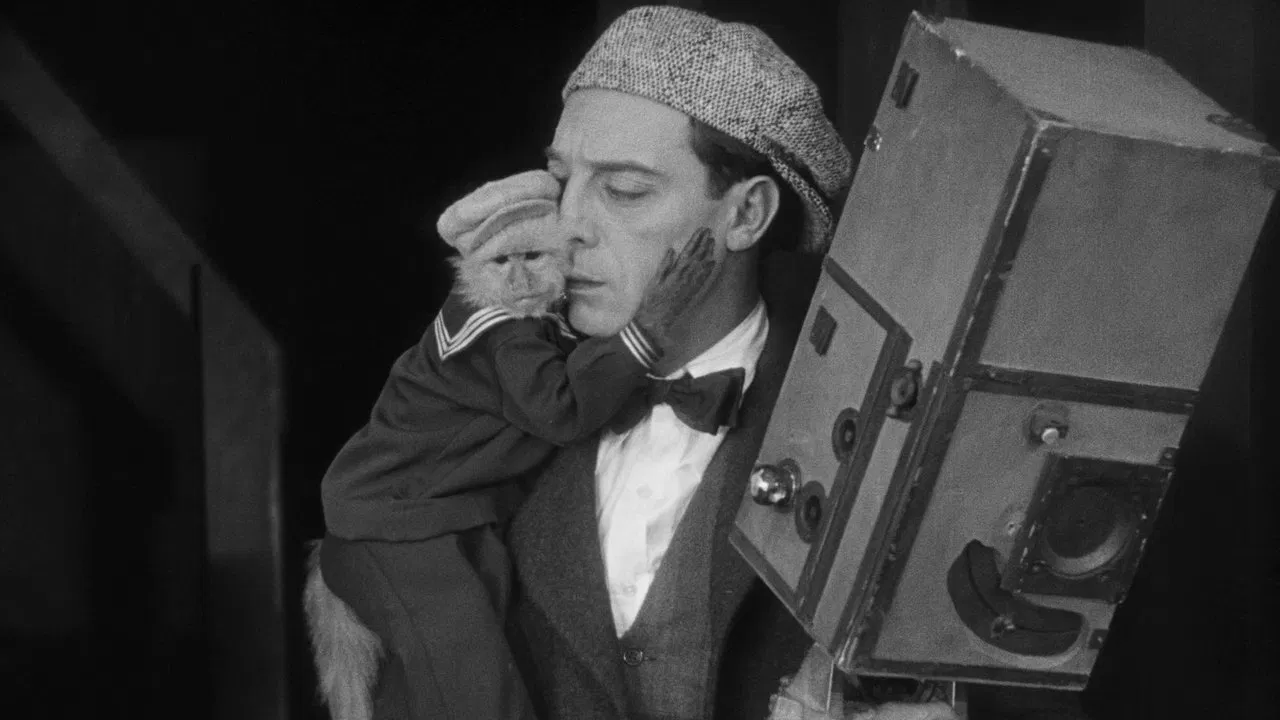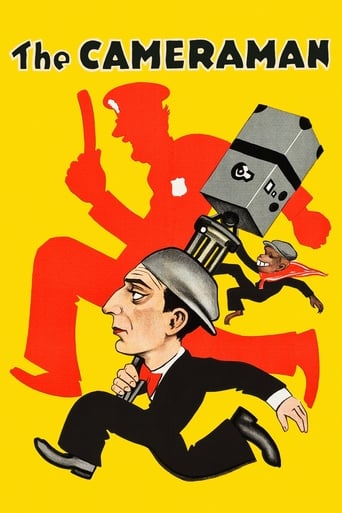StunnaKrypto
Self-important, over-dramatic, uninspired.
Stometer
Save your money for something good and enjoyable
Leoni Haney
Yes, absolutely, there is fun to be had, as well as many, many things to go boom, all amid an atmospheric urban jungle.
mmallon4
The Cameraman is my 2nd favourite Buster Keaton feature after Sherlock Jr. A film which manages to hit every beat and even MGM themselves believed in the film enough that it became their comedy training film for new writers as the example of a perfect comedy; I can't argue with that. Like the aforementioned Sherlock Jr, The Cameraman reflects a fascination with filmmaking in which Keaton has to act like he doesn't know anything about the anatomy of a camera.Once again Keaton (playing a character conveniently called Buster) is competing for dominance and the love of a woman in a world of alpha males. What makes the relationship between Buster and love interest Sally (Marceline Day) work so well? Her sympathy, or the fact that she is one of the few people in the film who doesn't act like a complete jerk towards Buster, even the bell boy at the fictionalised MGM newsreel department is a jerk to him when Buster simply asks about the woman in his photograph despite him being a super sweet guy. Does MGM want people thinking their newsreel department is full of jerks? Or is it the little things such as her first encounter with Buster when he first bumps into her he smells her hair and goes into a trance without her noticing. You can feel the chemistry between them from their body language and even from close-ups of the two starring at each other. Likewise there is the relatability of any man who has tried to impress a girl only for his effort to be a failure by the presence of a bigger, stronger man. - Plus there is the adorable factor from seeing the two of them together. When Buster gets a kiss from Sally as he leaves her off at an apartment and then walks away in the rain with a sense of elation has Singin' In The Rain vibes; was Gene Kelly inspired by this?The Cameraman is one of those rare films which is comprised of one great moment after another. The scene in Yankee Stadium for example has no effect on the rest of the plot but there's no justification required in order to watch Keaton's athletic prowess as he pretends to play baseball by himself. Likewise the sequence on the stairs is a wonder of Keaton's ability to use the frame in what looks like to modern eyes as a 2D platforming video game. Another superb use of this comes in the pool sequence in which Sally walking by the poolside in a swimsuit then suddenly all of the men get out of the pool entering from the bottom of the frame out of nowhere. Likewise keep an eye out for the on screen nudity. This sequence also gives arise to possibly the most bizarre moment in The Cameraman in which Keaton after losing his bathing suit in the pool begins eyeing a woman wearing an excessive bathing suit and starts approaching her while Jaws-like music plays (as part of the wonderfully quirky modern score by Arthur Barrow). Off-screen he steals the suit but we never see how; just what exactly did he do to her? It's both creepy and funny at the same time. I have to ask if automobiles back then were designed for use in comedy such as an open top double decker bus which creates so many possibilities for physical comedy. However the most oddly designed vehicle present in The Cameraman has to be the 1927 LaSalle Convertible Coupe Fisher with its seat on the back of the car separate from the main seats of the vehicle. The seat is already inherently de-emasculating by itself, even worse when your girl is at the front with another guy and you're completely cut off from them because the roof is up to protect them against the rain. Oh yeah, that's another thing, when it rains you have no protection. Again I have to ask, was this vehicle designed for use in comedy?The Tong War is among one of the greatest of Keaton spectacles with its large-scale carnage and extras galore; plus I do love the fascinating underworld of the tongs and opium dens as a setting. The moment in which Keaton is confronted by gangsters and is cornered is one of those oh so glorious "how is he going to get out of this?!" moments. By the end of the film Keaton goes through so much misfortune that you badly want to see him succeed in the end. At the end he gets his sweet, satisfying revenge while the douche who takes credit for rescue Sally from the out of control speedboat gets his comeuppance. The revenge is unintentionally obtained but more than very well deserved.
MissSimonetta
The Cameraman (1928) is Buster Keaton's last great film, before drink and MGM's misguided stifling of his creativity effectively ended his career as a director-star. It is about an aspiring newsreel man who seeks the love of a secretary at MGM studios (a little self-promotion never hurt Leo the Lion, it seems). He looks for any kind of action to capture on the streets, contends with a slimy rival for his lady love's affections, and befriends a monkey. Like Keaton's best films, we have his sly and dry humor, action scenes, and lots of imagination.Of course, the movie differs from Keaton's pre-MGM work in key ways: it is incredibly romantic in a way Keaton avoided being in his earlier work. The love stories in some of Keaton's earlier films are fraught with misery and seem to promise little lasting happiness for both partners. Other ones are more grounded though pleasant, such as in The Navigator and The General, where Keaton's heroes end up with feisty girls who are more like comic partners than passive love objects who wait impatiently for Buster to man up and win their respect. In TC, Marceline Day is a different sort of love interest for Keaton: she is sweet, an ideal, a light in the young cameraman's seemingly dreary and lonely existence. In The General or Sherlock Jr., the young hero is lovelorn but also independent. He can live with or without love, though he's willing to fight for love at all costs. Here Buster's character lacks that kind of toughness and seems more vulnerable. This vulnerability allows Keaton to show a little more tragedy in his acting than what we normally get to see and it is fascinating. No one who has ever seen this film can forget the "descent into the sand" scene, where Buster thinks he has lost the girl of his dreams forever. The heartbreak and longing in Keaton's eyes, hands, his posture are so potent that it shocks me that viewers still call him stone-faced and cold.But don't let us forget this is a romantic comedy and there are lots of laughs to be had. It's Keaton last great silent film, a sort of walk into the sunset for his golden age.
Djayesse
In New York, Buster (Keaton) is a public photographer. You can get your picture taken for ten cents. While he is taking a picture, a big parade takes place: many people gather and among them, Sally (Marceline Day) a young woman who works for the News department at the MGM. The crowd is so big that he is pressed against her, smelling her perfume... After the crowd disappears, he offers to take her picture. She agrees but has to go leaving him with her photograph. When he visits her at work, he decides to be a cameraman... Then he will be able to see her anytime! But you do not become a cameraman just like that: you have to learn how to do it. First, it is an expensive job: he has to buy a camera. Even if he gets the cheapest one, he has not got any money left. Then you have to move the handle the right way: this gives a sequence where you can images moving forwards and backwards, an overprinted ship in a street, and a sequence where the picture is multiplied. A very surrealistic movie which does not please the MGM News director. But Sally still encourages him to go on. She even accepts a date with him. But things do not work as expected. Still, she gives him a last chance : go and film the Chinese New Year. You can guess how it will end... This film is Keaton's penultimate movie. The talkies are coming: The Jazz Singer was released by the Warner Bros Company. This is Keaton's swan song. There is much melancholy, and even sadness in this story. Everything falls apart. Anything he tries is a failure. Even when he wants to end it all and go back to tintypes (he sends his last film to the studio) : instead of being mocked, he is hired! Nevertheless, this film contains great scenes: the stairs, the swimming-pool, the Tong war... Moreover, Keaton teaches us a great reporting lesson: he show us how things work behind the scene. He even rearranges the fights during the Tong war (nobody does that...), but still close to the fighters, risking his own life! As I said earlier, it is his swan song. Kea ton will be less and less important in the film industry. And the last sequence has something prophetic in it: the film ends where it started, with a big parade which he thinks has been organized for him! But this was the day Lindbergh was celebrated after he crossed the Atlantic Ocean. His next movie will be Spite Marriage. Sadness and melancholy will be stronger. Meanwhile, let us enjoy this movie as it is: a very fine comedy, one of Keaton's best. So, enjoy!
SnoopyStyle
Buster (Buster Keaton) is a lowly sidewalk tintype portrait photographer in NYC. He is infatuated with Sally (Marceline Day) who is a secretary at MGM Newsreels. He needs his own camera to even get a trial so he spends his savings to purchase an old film camera from the pawnshop. The others laugh at his incompetent work but Sally admires his attempt and goes out with him. Sally gives him a tip and he stumbles onto a big shootout in Chinatown. The problem is that he forgets to put film in the camera but maybe the monkey switched out the film... The monkey... Harold takes Sally on a boat race and crash. Buster rescues Sally but when she wakes up, she thinks that Harold saves her. The monkey had filmed the rescue and the studio finds Buster's Chinatown film as well as the rescue. Sally discovers the truth and they live happily ever after (with the monkey?).Buster Keaton is at his stone-faced pratfall best. He is absolutely charming and hilarious. His stunts are terrific. He is the bumbling stunt machine as he keeps trying to impress Sally. He is the adorable poor sap.

